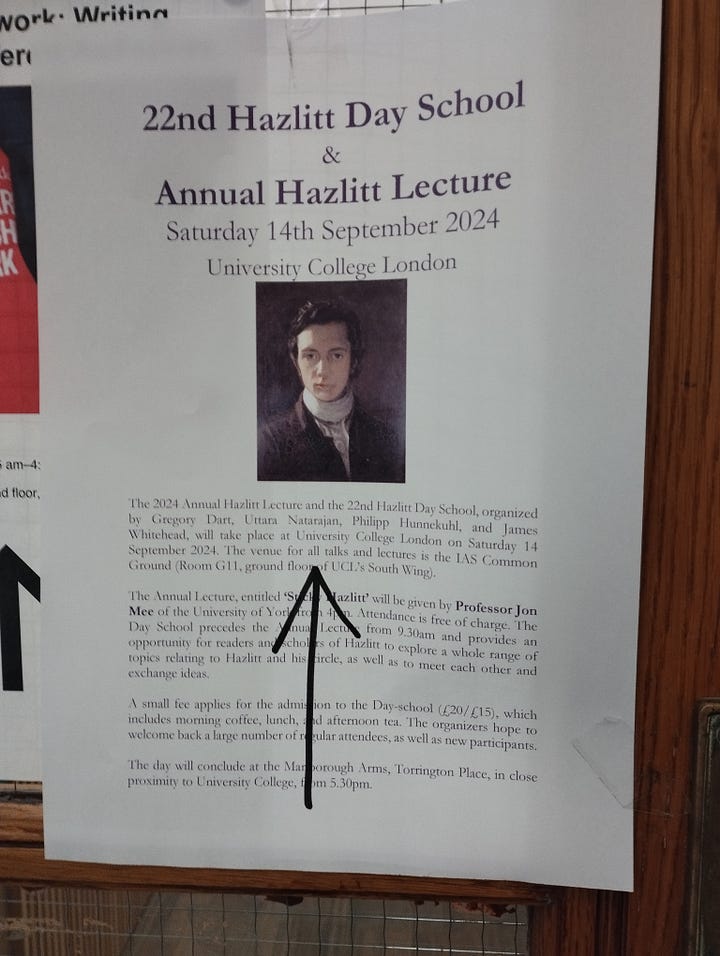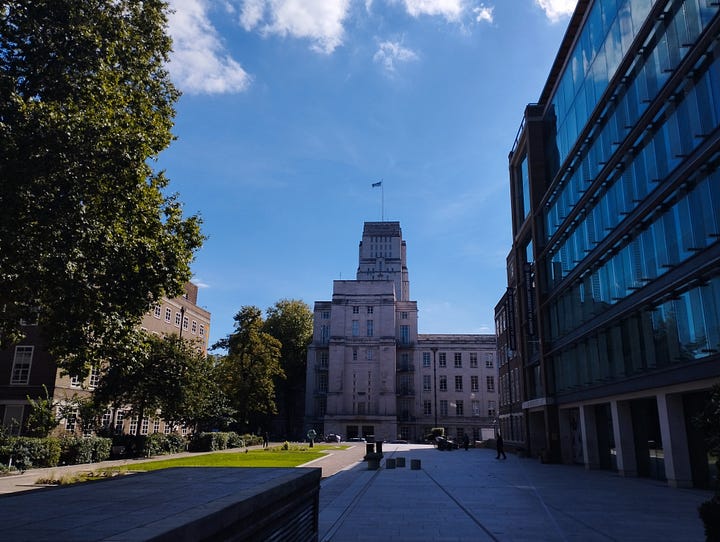

Yesterday, as I was leaving Professor Jon Mee’s lecture, Sticky Hazlitt, it dawned on me that I’ve been attending these events since they started; which, according to the flyer, is 22 years — which surely can’t be right. Perhaps it is, as I was at the ceremony marking the restoration of Hazlitt’s grave (having contributed to the fund) in St Ann’s Churchyard, Soho in April 2003.
The dedication on his gravestone reads, in part:
He was / The first (unanswered) Metaphysician of the age / A despiser of the merely Rich and Great / A lover of the People, Poor or Oppressed / A hater of the Pride and Power of the Few / as opposed to the happiness of the Many / A man of true moral courage / Who sacrificed Profit and present Fame / To Principle / And a yearning for the good of Human Nature / Who was a burning wound to an aristocracy / That could not answer him before men / And who may confront him before their Maker / He lived and died / The unconquered Champion / of / Truth, Liberty, and Humanity…
You might suppose such rhetoric is somewhat overblown; but Hazlitt was a remarkable writer, journalist and champion of liberty in an age of state-led repression. Not all his writings were explicitly political and he is also known for his theatre and poetry reviews, but it was his elegant battles against cant and the peddlers of hypocrisy which stand out, and remain especially relevant.1
Nearly 200 years after Hazlitt’s death I often wonder how well, and how widely his writings (some 20 volumes in all) are still read. I make no secret of the fact I’m a huge fan of his works and have shamelessly copied his habit of using ‘On’ to precede his essay titles.2
Hazlitt’s work is obviously of its time, it’s a little ponderous to read in places, and not all the references will ring a bell with modern audiences, but he remains eminently readable, and relevant too, given the importance of “speaking truth to power”.
I try to reread a selection of Hazlitt’s essays and writings every year, especially if I’ve managed to attended the annual conference, and I thought it might be useful to produce a ( wildly idiosyncratic ) top-five for the readers’ delectation:
‘The Fight’, New Monthly Magazine, February 1822. Probably Hazlitt’s most accessible and well-known essay is an account of his attendance at the boxing match between William Neate and Thomas Hickman in Hungerford, on 11 December 1821. Early sports journalism with a dollop of social commentary;
‘On Reading Old Books’, New Monthly Magazine, February 1821; fairly self-explanatory. He starts: “ I hate to read new books. There are twenty or thirty volumes that I have read over and over again, and these are the only ones that I have any desire ever to read at all…”;
‘On A Sun-Dial’ (1827) was written after his European tour as an ode to resisting the mechanical march of industrialised time;
‘The Letter Bell’, published posthumously in 1831, one of Hazlitt’s last pieces finished just before his death, a poignant evocation of the ‘long-lost’ business of receiving and sending letters several times a day;
Last, but no means least, my personal favourite ‘The Character of John Bull’, 19 May 1816, an early essay, yet still a devastating evisceration of the awkward English character…
John means well too, but he has an odd way of showing it, by a total disregard of other people’s feelings and opinions. He is sincere, for he tells you at the first word he does not like you; and never deceives, for he never offers to serve you. A civil answer is too much to expect from him. A word costs him more than a blow. He is silent because he has nothing to say, and he looks stupid because he is so…After all John’s blustering, he is but a dolt. His habitual jealousy of others makes him the inevitable dupe of quacks and impostors of all sorts; he goes all lengths with one party out of spite to another; his zeal is as furious as his antipathies are unfounded; and there is nothing half so absurd or ignorant of its own intentions as an English mob...
These are just a few crumbs of Hazlitt’s work, although most, maybe not all of his 20 volumes of writings, including 4 volumes of his life of Napoleon are available on-line, so I’d strongly recommend taking a little time to (re)acquaint yourself with his words.
Before I go, just a couple of lines from ‘On Londoners and Country People’, The Plain Speaker (1826), which had me giggling:
In London there is a public; and each man is part of it. We are gregarious, and affect the kind. We have a sort of abstract existence; and a community of ideas and knowledge (rather than local proximity) is the bond of society and good-fellowship. This is one great cause of the tone of political feeling in large and populous cities. There is here a visible body-politic, a type and image of that huge Leviathan the State. We comprehend that vast denomination, the People, of which we see a tenth part daily moving before us; and by having our imaginations emancipated from petty interests and personal dependence, we learn to venerate ourselves as men, and to respect the rights of human nature. Therefore it is that the citizens and freemen of London and Westminster are patriots by prescription, philosophers and politicians by the right of their birth-place. In the country, men are no better than a herd of cattle or scattered deer.
See, Anthony Benn, ‘What We Owe to William Hazlitt’, Hazlitt Review, vol. 4 (2011), 5-10. https://www.ucl.ac.uk/hazlitt-society/sites/hazlitt-society/files/HazlittReview4.pdf
I’m sure he didn’t invent the concept, but still.


Hazlitt is new to me. Thanks for this recommendation.
I love William hazlitt. He's one of my favorite writers ive found. His essays are wonderful. Nice to find another fan.